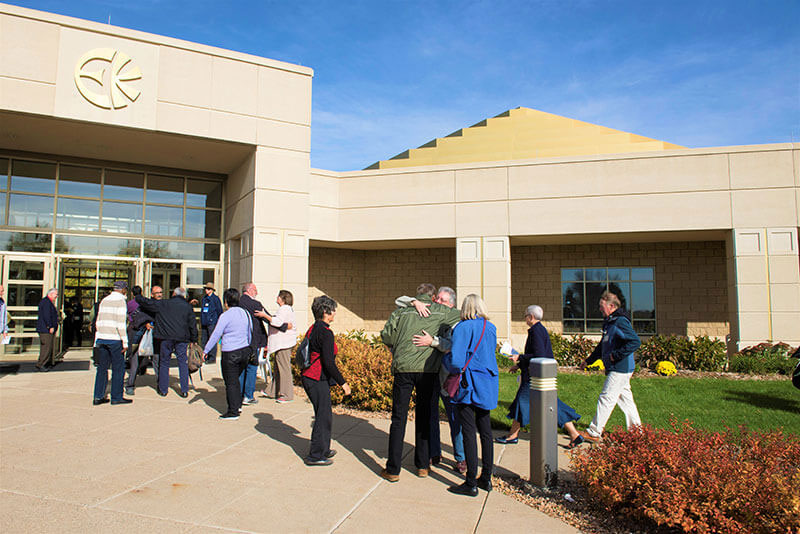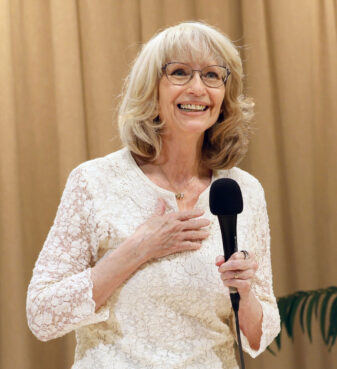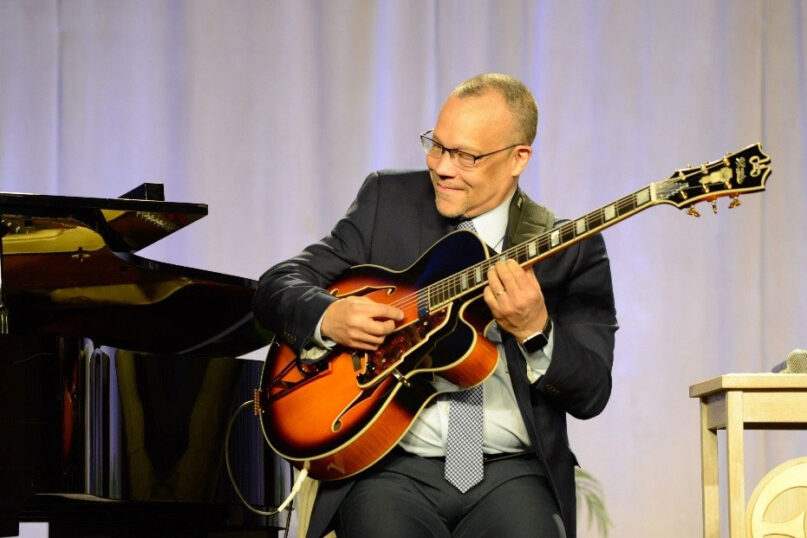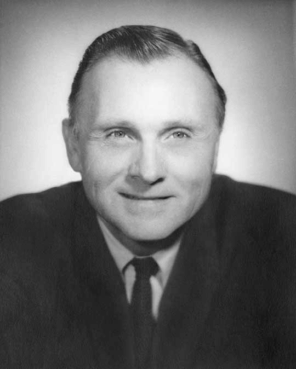
(RNS) — In 1970s New England, then-25-year-old Sharon Kunin, a pastor’s daughter, was full of out-of-the-box questions her Presbyterian upbringing didn’t quite answer — a typical countercultural shift seen in her generation.
“I had my own little truth detector,” Kunin told RNS. “I looked at so many different paths, and then I’d come to, like, a cul-de-sac where it would end, or there was something that wasn’t quite fitting.”
But everything changed when Kunin found a book by Paul Twitchell, the founder of the 1965-born American new religious movement Eckankar, also known as the Path of Spiritual Freedom. Inspired by Eastern mysticism, Eckankar, which means “coworker with God,” is a Western spiritual path that teaches that each unique soul can connect directly with God through personal experience — a belief, Kunin said, that can coexist with any religion.
“I actually started trembling because I was thinking, ‘Oh, my God, these are my thoughts,'” she said. “This is what I think, they’re addressing the very questions that I have. And I thought, ‘I have found it.'”

Sharon Kunin speaks on the theme of “Connect with the God Current” at a spiritual event at the Temple of ECK, home of Eckankar, in July 2025. Photo courtesy Eckankar
A few years later, Kunin moved to be near the Temple of ECK in rural Minnesota, the headquarters for thousands of what are known as ECKists worldwide. She is now a senior cleric and spiritual educator. In her role, Kunin facilitates workshops to help ECKists connect with God through chanting the sacred mantra HU (pronounced “hyoo”), analyzing dreams and “soul travel,” or one’s consciousness moving beyond the physical plane into higher spiritual realms.
“All kinds of people come here, and they want to talk about a spiritual experience that they had — an awakening, a dream, some miraculous coincidence, something that changed them,” she said. “They are so grateful that they can share their journey with people in Eckankar who just nod and smile and say, ‘yeah.’ What we offer is understanding, openness, acceptance and validation.”
This Saturday (Oct. 25), some of the world’s ECKists, who reside in more than 120 countries, predominately in Europe and Africa, will converge at the temple for their annual Worldwide Soul Adventure seminar. This year, they will also celebrate 60 years since Eckankar’s founding and ring in a new spiritual year, themed “the year of light and sound.”
But this year’s gathering is significant for another reason: Sri Harold Klemp, the living ECK master, will formally introduce his successor, marking the first transition in Eckankar’s leadership in more than four decades. An unknown male considered to be part of Klemp’s spiritual lineage, to be announced at the event, is to carry the group into the next 60-year cycle.
The transition lining up at the 60-year mark is pure “divine coincidence,” Kunin said, decided between the Mahanta, another name for the leader, and God.
“This transition doesn’t happen until that’s what’s needed for the consciousness of the worlds to take another step, which isn’t something necessarily visible to human eyes, ears, hearts or understanding,” said Kunin, who has worked closely with the 83-year-old Klemp. “But no matter what happens in the world or around us, there is always a path to inner peace and purpose and the rightness of life and living, and it’s waiting to be awakened. The living ECK master’s job is to awaken that love and knowledge for the divine things that are already in the beating human heart.”
Kentucky-born Twitchell, who wrote that he studied with Indian spiritual teachers before forming his own group, is said to have been influenced by Sant Mat, a 19th-century Indian spiritual movement that blended elements of Sikh and Hindu mysticism. Like Sant Mat and other Dharmic traditions, Eckankar uses Sanskrit terminology, emphasizing karma, reincarnation, guru-student relationships and divine sound chanting, which the group believes links the soul to God.
The movement was once estimated to include 50,000 students. And although exact figures are unknown, over the last 60 years, even after the initial boom of Eastern philosophies in America, many are still involved in weekly services, discussion groups and classes geared toward all ages, Kunin said.
Longtime ECKist Rodney Jones, a decorated jazz guitarist and Juilliard School professor who once played alongside musician Dizzy Gillespie and on “The Rosie O’Donnell Show,” said whoever is named the new master, “whatever his approach is, and whatever his particular way of sharing it is, my work is the same.”
“The work is to be in service to all life, to make contact consciously with the divine spirit, to be a channel for that, to be a good neighbor, to be someone who honors other people’s pasts, and to see the good in everyone,” Jones told RNS. “(One’s) soul is on a journey to unfold and to experience more of God’s love, and to ultimately become a conduit and a vehicle for that love for others. The purpose of life is to learn to give and receive this love to that end.”
Like Kunin, Jones was raised by a Christian minister, Lawrence Jones, who served as the dean of Howard University’s divinity school for over a decade. Jones was initiated into Eckankar in 1978, after coming across an ECK book that resonated with him. However, he has not abandoned the faith of his upbringing. “The heart of God flows through many different rivers,” Jones said. “You don’t fit yourself to the teachings of Eckankar. You fit them to you.”
“I know for a fact that God is in the church, God is at an ECK seminar, God is at a temple, God is in a mosque, God is in a field and God is in a pet store, and I don’t put a separation on that,” he said. “What does make a difference is (asking), what is the channel through which divine spirit is working with me and helping me to unfold and serve life as best I can? And that’s an individual choice that’s sacred for every person.”

Rodney Jones performs at the 2019 Eckankar Worldwide Seminar in Minneapolis. Photo courtesy Eckankar
And through music, which is essential to the Eckankar tradition, Jones said God has designated his soul’s unique purpose to create a “doorway, portal and beautiful canvas” for others to “find their next step in whatever way that is, or maybe just have a sense of peace.”
Sam Woodward, a 28-year-old Maine native, was born and raised in a 30-person Eckankar congregation near his home, thanks to his father, who found the local branch in the 1980s. Though Woodward left the faith in 2019 after his father died, the teachings of Eckankar, Woodward said, undoubtedly shaped his moral compass as a young person.
“A lot of the teachings just have to do with caring for other people and understanding that what you see on the surface isn’t actually the reality of the way that people are thinking about you,” he said. “All of the people were just truly, insanely kind. Some of them had a lot, and some of them had nothing, but they all had just a very deep sense of compassion.”
Unlike institutional religions, he said, there are no strict rules in the Eckankar community, and most of the time ECKists spend together is in sharing and confiding in one another about their lives and meditating on HU. And though he is unsure if a wave of young people will revive Eckankar in this age — partially due to its open-door, rather than recruitment, policy — Woodward said the tradition is a possible spiritual answer today’s youth seem to be seeking.
“I think that any sort of community that gives people hope and that looks for something more than what is physically in front of us can have beneficial effects on people because I think that being nihilistic is hard for your mental well-being,” he said.

